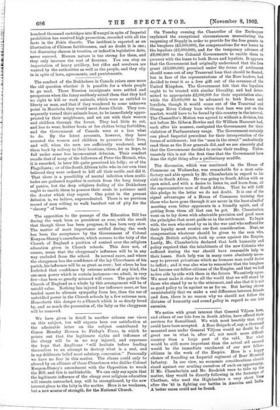The discussion, which was continued in the House of Commons
on Wednesday, was remarkable for a most satis- factory and able speech by Mr. Chamberlain in regard to his visit to South Africa. He was going to South Africa with an open mind, and with a desire to listen to, and learn from, all the representative men of South Africa. That he will fulfil this pledge to the letter we do not doubt. It is one of the signal advantages of a House of Commons training that those who have gone through it are never in the least afraid of meeting even bitter opponents in a friendly spirit, and of getting from them all that can be got. Mr. Chamberlain went on to lay down with admirable precision and good sense the principles that must guide us in the settlement. To begin with, the men who stood by us in the war and who suffered for their loyalty must receive our first consideration. Next, no compensation whatever should be given to the men who, though British subjects, took up arms against the Empire. Lastly, Mr. Chamberlain declared that both humanity and policy required that the inhabitants of the new Colonies who suffered during the war should have reasonable help in their losses. Such help was in many cases absolutely neces- sary to prevent privations which no humane man could desire to inflict ; and it was also wise to remember that the burghers had become our fellow-citizens of the Empire, and that we had to live side by side with them in the future. We entirely agree. We must make it clear to all the world that we will stand by those who stand by us to the uttermost, and also that it is not as good policy to be against us as for us. But having shown unmistakably that we make a real difference between friends and foes, there is no reason why we should not follow the dictates of humanity and sound policy in regard to our late enemies.










































 Previous page
Previous page